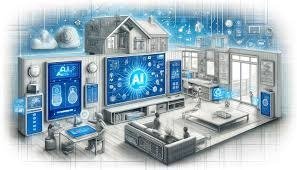As technology continues to advance, the concept of a “smart home” has evolved from a futuristic idea into a practical reality. Artificial Intelligence (AI) is at the forefront of this transformation, making home automation more intuitive, efficient, and user-friendly. From energy management to enhanced security, AI is redefining how we interact with our living spaces. This article delves into the exciting applications of AI in home automation and the benefits it brings to everyday life.
The Rise of Home Automation
Home automation involves the control of household systems such as lighting, heating, security, and appliances through smart technology. With the advent of AI, these systems can now learn from user behavior, adapt to preferences, and communicate with one another, creating a seamless living experience.
How AI is Enhancing Home Automation
- Smart Assistants
AI-powered virtual assistants like Amazon Alexa and Google Assistant serve as central hubs for smart homes. These assistants can control various devices, provide information, and learn user preferences over time, making daily tasks more convenient. - Energy Management
AI can optimize energy consumption by learning patterns in user behavior. Smart thermostats like Nest utilize AI to adjust heating and cooling based on when people are home, helping reduce energy bills and environmental impact. - Security Systems
AI enhances home security through smart cameras and alarms that can identify faces and recognize unusual activity. Systems like Ring and Arlo employ AI to send alerts to homeowners when suspicious movements are detected, providing peace of mind. - Smart Lighting
AI-driven lighting systems can adjust brightness and color based on the time of day or user preferences. Solutions like Philips Hue allow users to create customizable lighting scenes that enhance ambiance and save energy. - Home Appliances
AI is making household appliances smarter, allowing them to learn from user habits. For example, smart refrigerators like those from Samsung can monitor food inventory and suggest recipes based on available ingredients, minimizing food waste.
Benefits of AI in Home Automation
- Convenience: Automation simplifies daily tasks, allowing users to control their homes with voice commands or through mobile apps.
- Energy Efficiency: AI helps optimize energy use, reducing utility bills and environmental impact.
- Enhanced Security: Smart security systems provide real-time monitoring and alerts, making homes safer.
- Personalization: AI learns individual preferences, creating customized experiences that enhance comfort and satisfaction.
Challenges and Considerations
While the benefits of AI in home automation are substantial, several challenges must be addressed:
- Privacy Concerns: As smart devices collect personal data, concerns about privacy and data security arise. Homeowners must ensure their devices are secure and comply with data protection regulations.
- Compatibility Issues: With a wide array of smart devices available, ensuring compatibility between different systems can be challenging.
- Dependence on Technology: Over-reliance on automation can lead to issues if devices malfunction or if there are connectivity problems.




